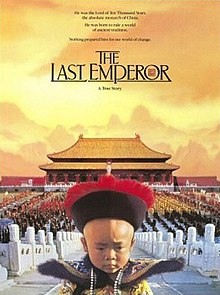| The Last Emperor | |
|---|---|
 Theatrical release poster | |
| Directed by | Bernardo Bertolucci |
| Screenplay by |
|
| Based on | From Emperor to Citizen: The Autobiography of Aisin-Gioro Puyi 1960 autobiography by Puyi |
| Produced by | Jeremy Thomas |
| Starring | |
| Cinematography | Vittorio Storaro |
| Edited by | Gabriella Cristiani |
| Music by |
|
Production companies | |
| Distributed by | Columbia Pictures |
Release dates |
|
Running time | 163 minutes[1] |
| Countries |
|
| Languages |
|
| Budget | $23.8 million[3] |
| Box office | $44 million[4] |
The Last Emperor (Italian: L'ultimo imperatore) is a 1987 epic biographical drama film about the life of Puyi, the final Emperor of China. It is directed by Bernardo Bertolucci from a screenplay he co-wrote with Mark Peploe, which was adapted from Puyi's 1964 autobiography, and independently produced by Jeremy Thomas.[5]
The film depicts Puyi's life from his ascent to the throne as an infant to his imprisonment and political rehabilitation by the Chinese Communist Party. It stars John Lone in the eponymous role, with Peter O'Toole, Joan Chen, Ruocheng Ying, Victor Wong, Dennis Dun, Vivian Wu, Lisa Lu, and Ryuichi Sakamoto (who also composed the film score with David Byrne and Cong Su). It was the first Western feature film authorised by the People's Republic of China to film in the Forbidden City in Beijing.[3]
The Last Emperor premiered at the 1987 Tokyo International Film Festival, and was released in the United States by Columbia Pictures on November 18. It earned widespread positive reviews from critics and was also a commercial success. At the 60th Academy Awards, it won all nine Oscars it was nominated for, including Best Picture, Best Director, and Best Adapted Screenplay. It also won several other accolades, including three BAFTA Awards, four Golden Globe Awards, nine David di Donatello Awards, and a Grammy Award for its musical score. The film was converted into 3D and shown in the Cannes Classics section at the 2013 Cannes Film Festival.[6]
- ^ "THE LAST EMPEROR (15)". British Board of Film Classification. 16 November 1987. Retrieved 29 March 2023.
- ^ "The Last Emperor (1987)". BFI. British Film Institute. Retrieved 8 May 2024.
- ^ a b Love And Respect, Hollywood-Style, an April 1988 article by Richard Corliss in Time
- ^ "The Last Emperor". Box Office Mojo. Retrieved 29 September 2016.
- ^ Variety film review; 7 October 1987.
- ^ Cite error: The named reference
:1was invoked but never defined (see the help page).